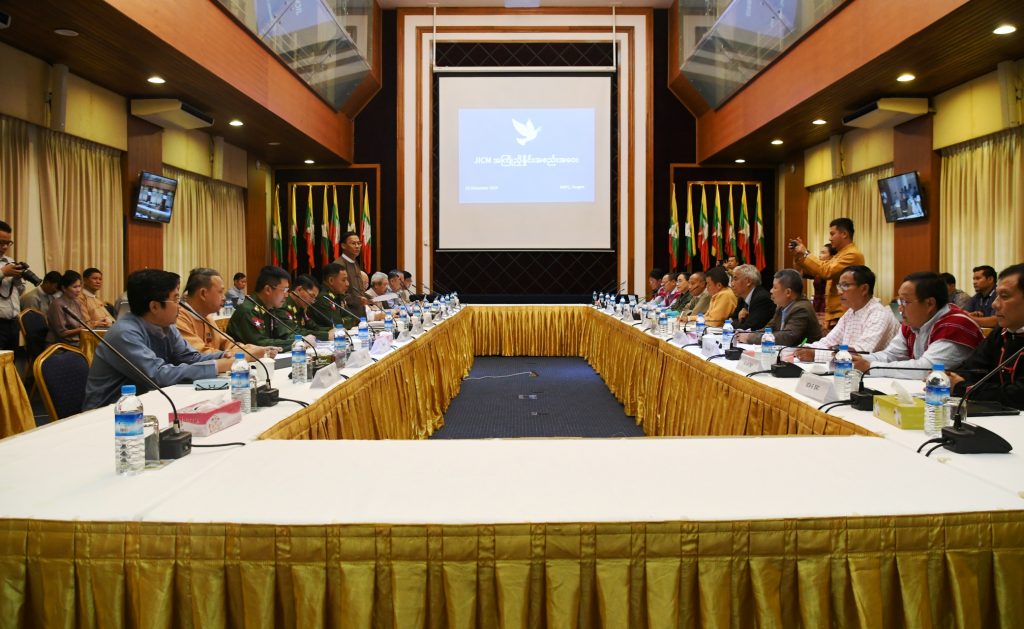23 December
Government delegation and NCA-S EAO (Ten Ethnic Armed Organizations signatories of the Nationwide Ceasefire Agreement) held a preliminary coordination meeting yesterday at the National Reconciliation and Peace Centre (NRPC) in Yangon, and agreed to organize the 8th Joint Implementation Coordination Meeting on Nationwide Ceasefire Agreement next month.
The coordination meeting was attended by NRPC Vice Chairman Union Attorney General U Tun Tun Oo, NRPC members Lt-Gen Yar Pyae, Lt-Gen Min Naung and Lt-Gen Tin Maung Win, Secretary of NRPC and Union Minister U Khin Maung Tin, NRPC secretary Lt-Gen (retired) Khin Zaw Oo, Pyithu Hluttaw representative U Pyone Cho, Peace Commission advisors U Hla Maung Shwe and U Moe Zaw Oo, and Director General U Zaw Htay from the Office of the Ministry of the State Counsellor.
Representatives of NCA-S EAO peace negotiation team at the meeting were its team leader U Sai Ngin, Dr Salai Lian Hmung Sakhong, U Myo Win, Daw Saw Mya Yar Zar Lin, Khun Myint Tun, Saw Sein Win, Pado Saw L Klu Sae, Saw Kyaw Nyunt, Nai Aung Ma Ngay and Saw Lamon.
In his opening remark, Union Attorney General U Tun Tun Oo said “The JICM could not be held after the third Union Peace Conference—21st Century Panglong. However, we made several meetings to adopt a pragmatic plan by reviewing the whole process.
Chairmen of KNU and RCSS sent their letters on 11 October 2018, heading to the State Counsellor and the Commander in Chief of Defence Services about their views and expectations of NCA-S EAO groups on the peace process.
In serious consideration of those recommendations, the government offered a four-point way forward for the peace process at the informal meeting of UPDJC secretaries held on 13 and 14 June this year.
The NCA-S EAO made a constructive response on the government suggestion, paving the ways for detailed and extensive discussions.
State Counsellor Daw Aung San Suu Kyi, as a Chairperson of NRPC, disclosed the three points of future peace process at the 4th anniversary of NCA held in Nay Pyi Taw in October.
The first peace process was the common process of how to proceed with 21st Century Union Peace Conference. This was proposed by the leaders of EAOs that had signed the NCA.
After accepting the requirement for a process that all agreed on in going forward based on the NCA, numerous unofficial meetings agreed on these three points to obtain a framework agreement on implementing NCA.
This framework agreement will be a part of the Union Accord that will be signed at the 21st Century Union Peace Conference fourth session.
The second was to attract all the stakeholders into peace process, to reduce conflicts with the armed organizations which have not signed the NCA.
The third one was to ensure all the people enjoy the fruitful results of peace and to fulfill the needs of people in conflict-affected areas.
A common agreement has been made to resume ceasefire talks by holding JICM with the active participation of all stakeholders.”
U Tun Tun Oo added the preliminary coordination meeting will discuss matters related to holding the JICM in near future, to organize the fourth Union Peace Conference—21st Century Panglong, and to resume Union Peace Dialogue Joint Committee (UPDJC) and Joint Monitoring Committee (JMC) which are the main mechanisms of NCA.
NCA-S EAO peace negotiation team leader U Sai Ngin said the preliminary coordination meeting was to discuss the issues raised on 25 October after reviewing them at respective organizations, and to hold talks on the future peace process after the 8th JICM.
He added the importance of regular holding of JICM as it is a crucial backbone in adopting policies and removing obstacles in implementing peace process.
Although it was scheduled to hold a JICM every three months, it could not be held over a year, causing speculations among the public on peace-making process.
He finally remarked that the time for peace process in 2020 will have only half of a year before the General Election next year, and that all the stakeholders were suggested to make discussions frankly and friendly to be able to organize the 8th JICM.
At the preliminary coordination meeting, the participants agreed for holding the next JICM meeting in early January, and on 8 points of resolutions on peace process.
Then, JICM negotiation team leader Sao Sai Win said, “The next JICM is scheduled to be held in the second week of January 2020. The participants could show their responsibility and accountability in peacemaking efforts as they could discuss preparations for the upcoming JICM.
He also said that the participants made agreements on trust-buildings and suitable ways for all-inclusiveness in peace efforts.
He then advised all the stakeholders to hold the next round of Union Peace Conference—21st Century Panglong by mid-2020.
Union Attorney General U Tun Tun Oo made a concluding remark, confirming the next JICM in early January, agreements on eight points of resolutions such as holding meetings of UPDJC and JMC.
After the meeting, U Hla Maung Shwe and Nai Aung Ma Ngay answered to questions of media groups on the meeting.— Ye Gaung Nyunt (Translated Aung Khin)


